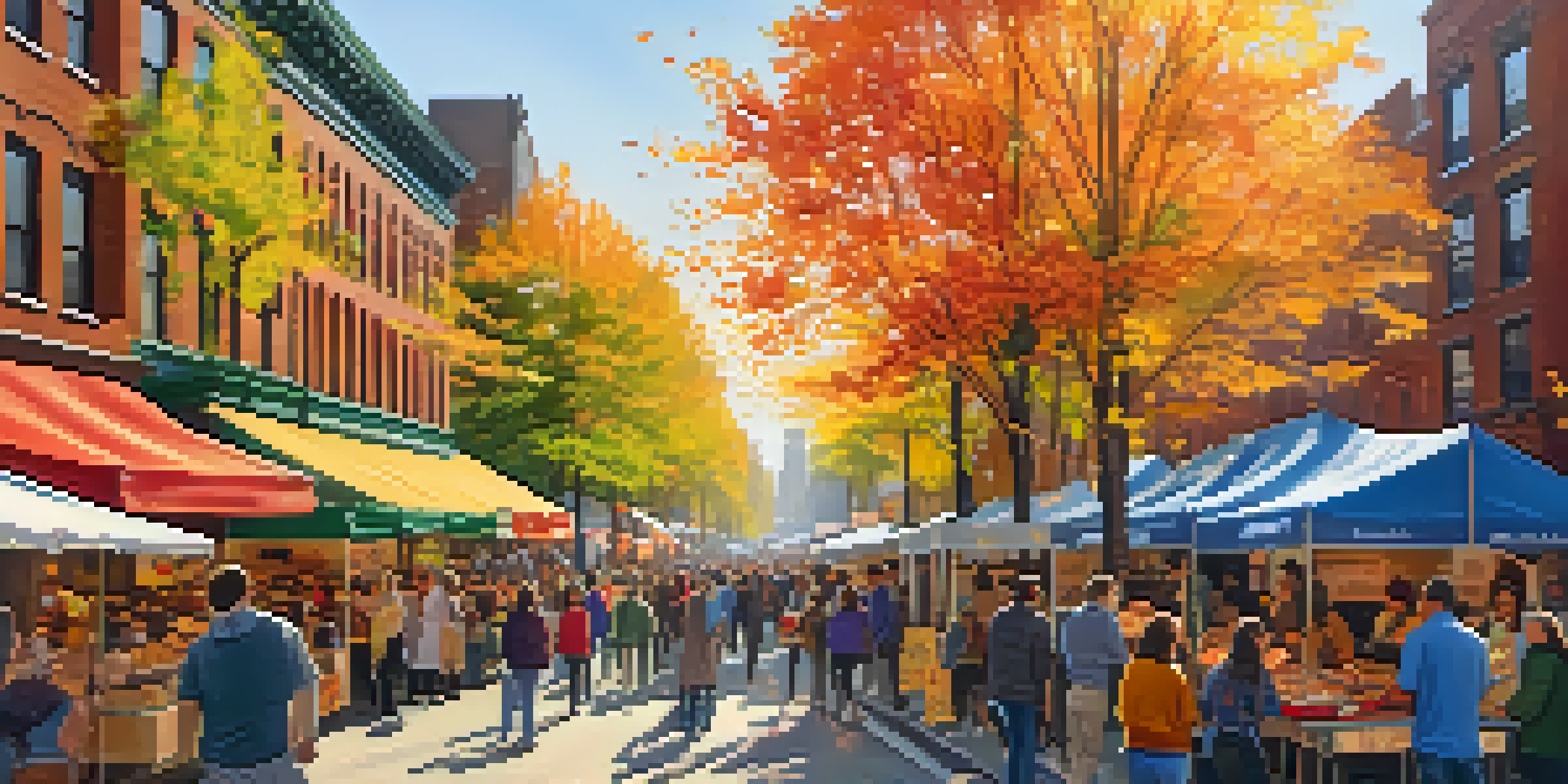The Role of Local Journalists in NYC's Social Movements

Understanding the Landscape of Local Journalism in NYC
Local journalism in New York City has a unique role, acting as the eyes and ears of its diverse communities. These journalists often report on issues that the mainstream media might overlook, such as neighborhood concerns or grassroots initiatives. This hyper-local focus provides a critical understanding of the social fabric of the city, allowing residents to engage with their communities more meaningfully.
Journalism is the first rough draft of history.
In a city where stories can easily get lost in the shuffle, local journalists shine a light on the voices that matter most. Whether it's a community board meeting or a protest, these reporters capture the essence of what’s happening on the ground, ensuring that the narratives of everyday people are heard. They help foster a sense of belonging and encourage civic participation, making their role indispensable.
Moreover, local journalism often serves as a bridge between communities and larger social movements. By highlighting local issues and challenges, journalists can connect these narratives to broader themes of activism and change, ultimately empowering citizens to take action.
Local Journalists as Catalysts for Social Change
Local journalists often act as catalysts for social change by bringing attention to pressing issues. For instance, when they report on inequities in housing or police practices, they not only inform the public but also spur community action. This coverage can lead to organized protests, policy changes, and a greater awareness of social justice issues among residents.

Take the example of housing instability in NYC. Journalists covering eviction rates and tenant struggles have mobilized grassroots organizations to advocate for tenants' rights. Their stories highlight the urgency of these issues, prompting community members to rally together and demand change from local officials.
Local Journalism Empowers Communities
Local journalists bring attention to issues that matter most to their neighborhoods, fostering civic engagement and a sense of belonging.
Furthermore, local journalists often collaborate with activists to amplify their causes. By working together, they can ensure that the narratives surrounding social movements are not only accurate but also resonate with a wider audience, fostering a sense of solidarity and urgency.
Documenting History: The Role of Local Journalists
Local journalists play a crucial role in documenting history as it unfolds, particularly during social movements. Their on-the-ground reporting captures the emotions, struggles, and triumphs of individuals involved in activism. This documentation becomes a valuable resource for future generations, preserving the stories that might otherwise be forgotten.
The function of journalism is to provide citizens with the information they need to make informed decisions about their lives and their communities.
For example, during the Black Lives Matter protests in NYC, local journalists chronicled the diverse voices of protesters, providing a narrative that represented the community's collective frustration and hope. These firsthand accounts not only inform public discourse but also serve as historical records of the fight for justice.
By preserving these stories, local journalists contribute to a richer understanding of the societal shifts occurring in real-time. Their commitment to capturing the essence of these movements ensures that the lessons learned and the voices raised are not lost to history.
Challenges Faced by Local Journalists in Social Movements
Despite their vital role, local journalists face numerous challenges when covering social movements. From limited resources to threats of censorship, these reporters often navigate a complex landscape that can hinder their work. The pressure to produce timely stories can sometimes come at the expense of thorough, in-depth reporting.
Additionally, local journalists may encounter pushback from authorities or even community members when covering controversial topics. The stakes are high, and the potential for backlash can discourage some reporters from pursuing certain stories, limiting the breadth of coverage available to the public.
Documenting Social Movements
Through on-the-ground reporting, local journalists capture and preserve the narratives of social movements, providing historical context for future generations.
Despite these challenges, many local journalists remain committed to their mission. Their resilience and dedication to uncovering the truth are what make them invaluable to the communities they serve, even when faced with obstacles.
The Impact of Digital Media on Local Journalism
The rise of digital media has transformed local journalism, offering new avenues for storytelling. Journalists can now share their work through social media platforms, reaching a broader audience and engaging with readers in real-time. This shift has enabled local journalists to quickly disseminate information about social movements and mobilize community support.
For instance, live-tweeting events or sharing video updates from protests can provide immediate insights into unfolding situations, allowing the community to stay informed. This immediacy can also amplify the reach of local stories, drawing attention from national and international audiences.
However, the digital landscape also presents challenges, such as the spread of misinformation. Local journalists must navigate this reality, ensuring that their reporting remains credible and accurate in an age where anyone can share a story with the click of a button.
Building Community Trust Through Local Journalism
Trust is paramount in journalism, especially within local communities. Local journalists build this trust by being present, listening to residents, and accurately representing their stories. When communities feel heard and seen, they are more likely to engage with local media and contribute to the dialogue surrounding social movements.
This trust is further established through transparency and accountability. Local journalists who openly share their processes and acknowledge mistakes foster a sense of integrity that resonates with their audience. This relationship encourages community members to share their stories, enriching the journalistic narrative.
Navigating Digital Media Challenges
While digital media enhances reach and engagement, local journalists must also combat misinformation to maintain credibility and accuracy in their reporting.
Ultimately, when local journalists earn the trust of their communities, they can effectively serve as conduits for change. This relationship empowers activists and residents alike, creating a more informed and engaged populace that is ready to advocate for social justice.
Future of Local Journalism in NYC's Activism Landscape
As NYC continues to evolve, so too will the role of local journalists in activism. With the rise of new technologies and changing media consumption habits, local journalists will need to adapt to ensure they remain relevant. This may involve embracing multimedia storytelling and engaging with audiences on various platforms to foster deeper connections.
Moreover, as social movements become increasingly global, local journalists will play a crucial role in framing these issues within the context of their communities. They will need to highlight how global movements intersect with local concerns, ensuring that the narratives remain intertwined and relevant.

The future of local journalism is bright, provided that these journalists continue to champion the stories that matter. By prioritizing community engagement and remaining steadfast in their commitment to truth, local journalists will remain integral to NYC's social movements for years to come.